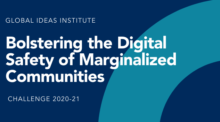While the Internet can be a source of endless information, opportunity, and connection, it can also exacerbate existing inequities and threaten the safety and well-being of individuals, especially those in marginalized communities. While digital technologies have enabled innovative responses to COVID-19 and helped to contain the virus through methods like contact tracing, this brief will discuss how some of these responses have also entailed human rights violations and have highlighted the digital vulnerabilities of the marginalized groups they disproportionately impact. Examples include contact tracing’s threat to data privacy and the increased use of surveillance technologies. Through analyzing digital responses to COVID-19, what can we learn about the digital safety of marginalized communities? What are the contexts, challenges, and barriers which must be considered to begin to meaningfully understand the digital experiences of marginalized individuals? How can we begin to address their digital vulnerabilities?1 As the purpose of this year’s challenge is to address the digital vulnerabilities faced by marginalized communities, a diverse range of marginalized voices will be amplified throughout the program.
This year, GII challenges students to develop innovative approaches, be they technical, educational, policy-oriented, or other, to bolster digital safety amongst marginalized communities.
Read the full 2020-21 GII Challenge Briefing document.
Find out how to get involved.
Read the Global Ideas Institute’s statement on COVID-19.
